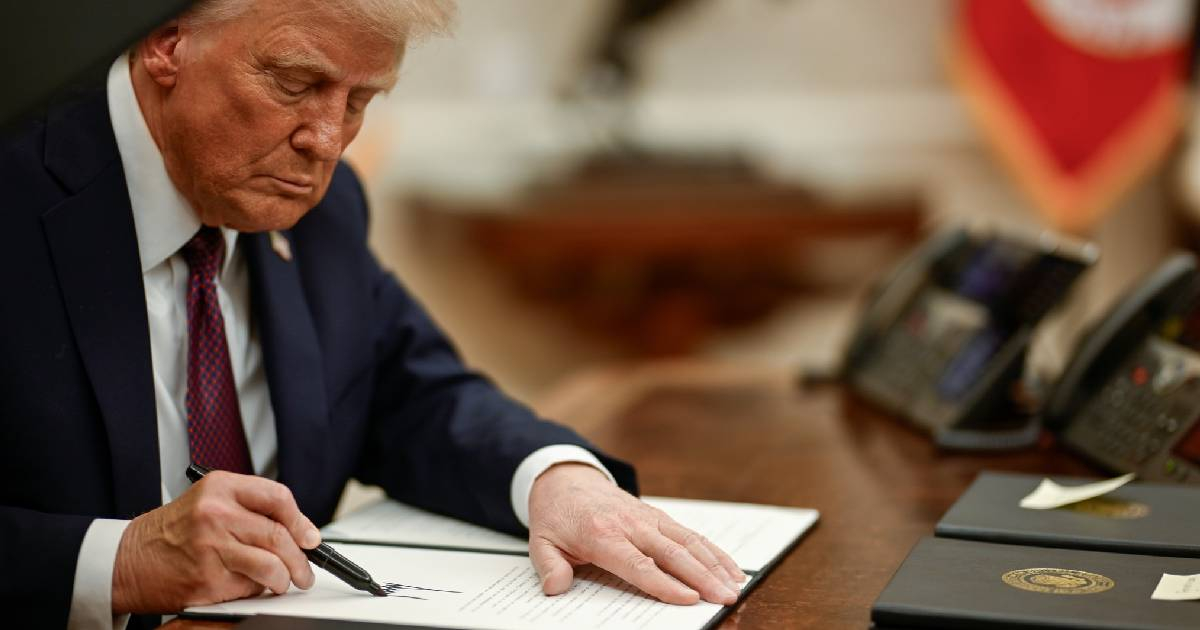
Related videos:
The President of the United States, Donald Trump, announced the imposition of a 25% tariff on imports of steel and aluminum from around the world, aiming to protect the domestic industry and reduce foreign competition.
Trump announced this decision to reporters aboard Air Force One while heading to the Super Bowl in Louisiana. “The tariffs are going to help. The tariffs are going to make it very successful,” he said.
Additionally, he announced that on Tuesday or Wednesday he will announce reciprocal tariffs, and added: "It's very simple, they charge us, we charge them." These tariffs will take effect "almost immediately."
Trump justified the decision by arguing that it is essential to safeguard the economic and national security of the United States. "If they are charging us 130% and we are not charging them anything, this will not stand", said the president, who stated that he plans to impose this starting this Monday.
In 2024, the United States imported steel and its manufactures valued at 81.084 billion dollars, with its main suppliers being Canada, China, Mexico, South Korea, and Brazil, according to data from the Department of Commerce.
In the same year, aluminum and its manufactured goods imports totaled 27.442 billion dollars, with Canada, China, Mexico, the United Arab Emirates, and South Korea being the main suppliers.
This is not the first time the Trump administration has imposed similar tariffs. In March 2018, under Section 232 of the Trade Expansion Act of 1962, global tariffs of 25% on steel and 10% on aluminum were established, arguing that foreign imports posed a threat to national security.
The international reaction was swift. According to information from El País, the European Union described the tariffs as "unjustified" and "contrary to the rules of the World Trade Organization (WTO)".
Brussels announced that it will take measures to protect European interests and is considering imposing retaliatory tariffs on American products.
In the financial realm, markets reacted with volatility to the announcement. While some European stock exchanges managed to recover, the steel sector showed signs of concern.
Companies like the Spanish multinational, based in Madrid, Acerinox experienced increases in their stock prices due to their presence in the U.S. market, but uncertainty remains.
Regarding Mexico, the steel and aluminum industry faces a significant challenge due to its high dependence on the U.S. market, which absorbs more than 80% of its exports in this sector.
It is expected that these tariffs will increase export costs, affecting the competitiveness of Mexican products in the U.S. market.
Analysts warn that this measure could trigger a large-scale trade war, impacting global supply chains and raising costs for consumers.
Negotiations and consultations between the United States and its trading partners are expected to take place in the coming days to address the concerns arising from this decision and seek solutions that prevent an escalation in trade disputes.
Frequently Asked Questions about Trump's Tariffs on Steel and Aluminum
Why did Donald Trump decide to impose tariffs on steel and aluminum?
Donald Trump decided to impose a 25% tariff on steel and aluminum to protect the national industry of the United States and reduce foreign competition. He argued that this measure is essential to safeguard the economic and national security of the country.
What are the main countries affected by tariffs on steel and aluminum?
The main countries affected by the tariffs on steel and aluminum are Canada, China, Mexico, South Korea, and Brazil, which are among the largest suppliers of these materials to the United States.
What impact could these tariffs have on Mexico and Canada?
Tariffs could have a significant impact on Mexico and Canada due to their high reliance on the U.S. market. An increase in export costs is expected and a possible reduction in the competitiveness of their products in the United States, which could negatively affect their economies.
How has the European Union responded to Trump's tariffs?
The European Union has described the tariffs as "unjustified" and "contrary to WTO rules." Brussels announced that it will take measures to protect European interests and is considering imposing retaliatory tariffs on American products.
Filed under: